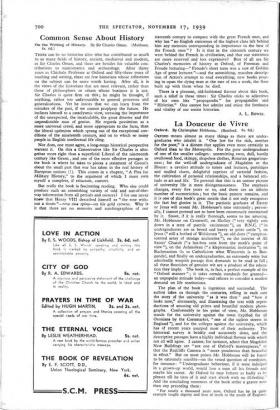Common Sense About History
THERE can be no historian alive who has contributed so much to so many fields of history, ancient, mediaeval and modern, as Sir Charles Oman, and there are besides his valuable con- tributions to numismatics and archaeology. After thirty years as Chichele Professor at Oxford and fifty-three years of teaching and writing, there are few historians whose reflections on the subject can be more worth having. After all, it is the views of the historians that are most relevant, rather than those of philosophers or others whose business it is not. Sir Charles is quite firm on this ; he might be thought, if anything, rather too unfavourable to general processes and generalisations. Yet he insists that we can learn from the mistakes of the past, if we cannot prophesy the future. He inclines himself to a cataclysmic view, stressing the importance of the unexpected, the incalculable, the great disaster and the unpredictable man of genius. He regards pessimism as a more universal creed, and more appropriate to the facts, than the liberal optimism which sprang out of the exceptional con- ditions of the nineteenth century, and on to which so many people in English intellectual life cling.
Nor does, one must agree, a long-range historical perspective warrant it. On this a Conservative like Sir Charles is alto- gether more right than a superficial Liberal of the nineteenth century like Green , and one of the most effective passages in the book is where he takes to pieces a statement of Green's about the small part that war has taken in the real history of European nations (!). This comes in a chapter, " A Plea for Military History," to the argument of which I must own myself a complete, if reluctant, convert.
But really the book is fascinating reading. Who else could produce such an astonishing variety of odd and out-of-the- way information from all periods and corners? I for one never knew that Henry VIII described himself as " the rose with- out a thorn "—rosa sine spina---on his gold crowns. Why is it that there are no memoirs and autobiographies of our
sixteenth century to compare with the great French ones, and why has " no English statesman of the highest class left behind him any memoirs corresponding in importance to the best of the French ones " ? Is it that in the sixteenth century we were behind the French in civilisation, and that our statesmen are more reserved and less expressive? Best of all are Sir Charles's memories of history at Oxford, of Freeman and Froude lecturing—" Froude's short term was a sort of Golden Age of great lectures "—and the astonishing, macabre descrip- tion of Acton's attempt to read everything, new books pour- ing in upon the dying man at the rate of ten a week, the floor built up with them when he died.
There is a pleasant, old-fashioned flavour about this book, such a relief in these times : Sir Charles sticks to adjectives of his own like " propagandic " for propagandist and " Hitlerian." One cannot but admire and enjoy the freshness and vitality of our senior historian.
A. L. ROWSE.




































































 Previous page
Previous page